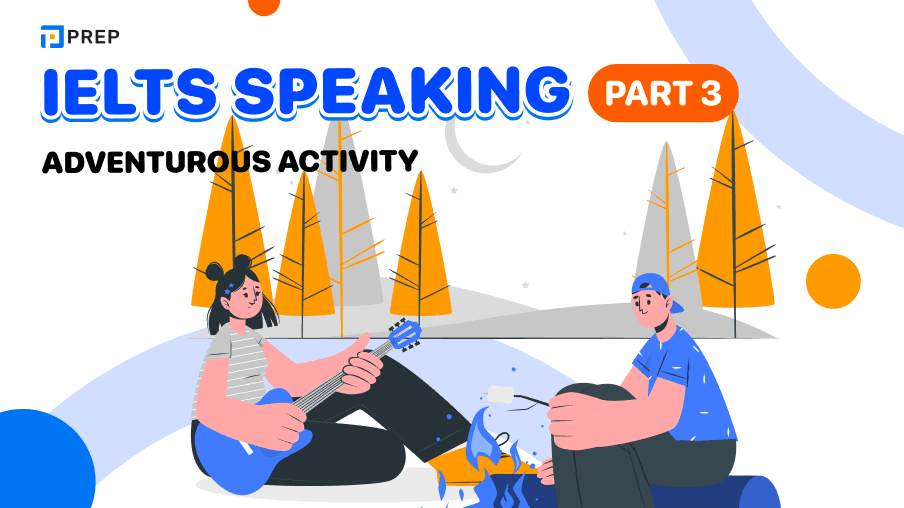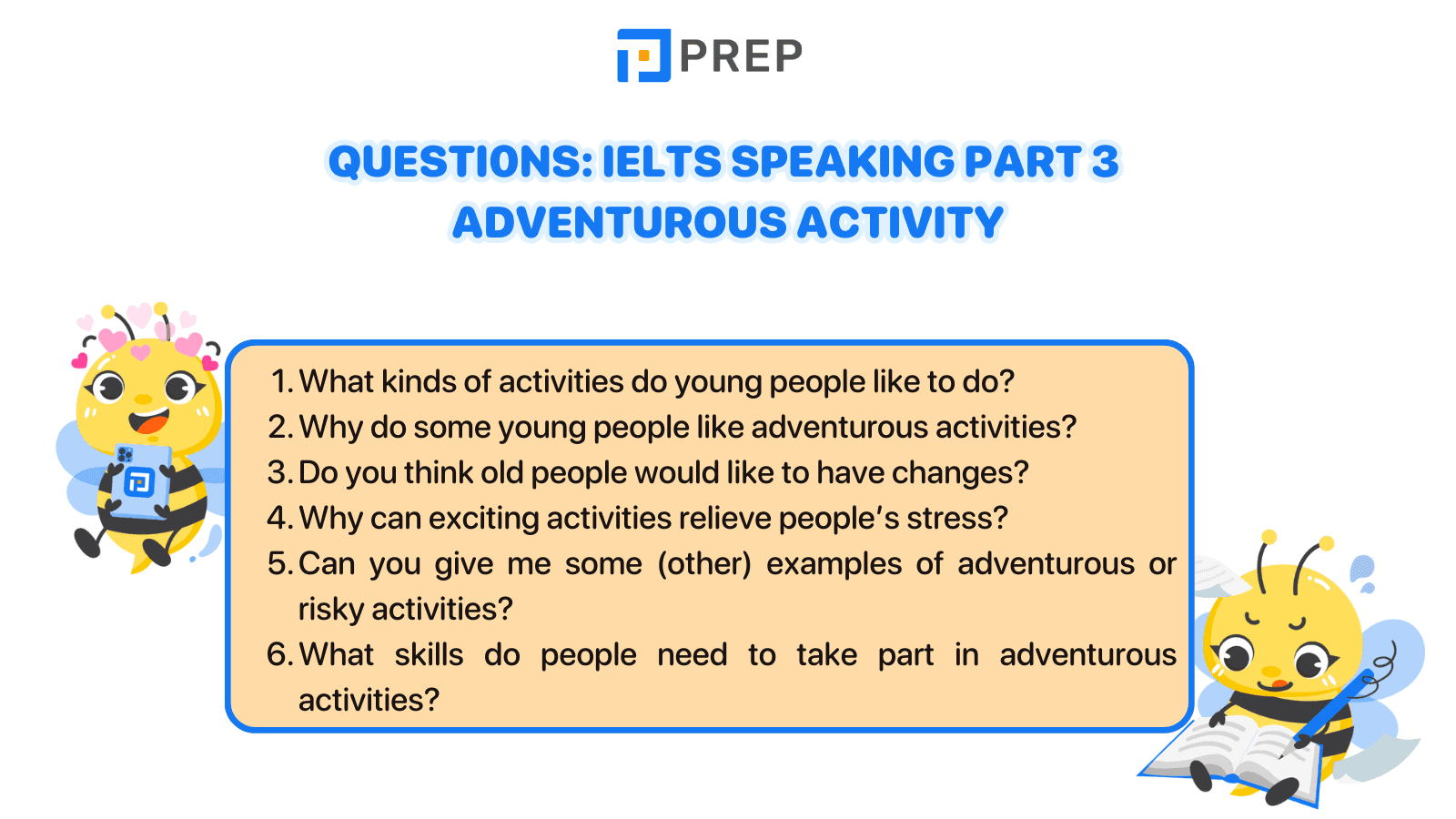IELTS Speaking Part 3 Adventurous activity
Outdoor activity and adventurous activity, although both refer to physical activities, will elicit different types of questions from the examiner in the IELTS Speaking test. In this article, let's explore together the questions, sample answers, and commonly used vocabulary in IELTS Speaking Part 3 Adventurous Activity.
*This sample was prepared by Mr. Nhat Pham, an IELTS 8.5 Overall achiever (9.0 Listening, 9.0 Reading, 8.0 Writing, 7.5 Speaking) and Marker Leader at PREP.
- I. IELTS Speaking Part 3 questions with answers on Adventurous Activity
- II. IELTS Speaking Part 3 topics with answers related to Adventurous Activity
- 1. What kinds of activities do young people like to do?
- 2. Why do some young people like adventurous activities?
- 3. Do you think old people would like to have changes?
- 4. Why can exciting activities relieve people’s stress?
- 5. Can you give me some (other) examples of adventurous or risky activities?
- 6. What skills do people need to take part in adventurous activities?

I. IELTS Speaking Part 3 questions with answers on Adventurous Activity
Here, PREP would like to share a list of common questions on IELTS Speaking Part 3 Adventurous Activity:
-
What kinds of activities do young people like to do?
-
Why do some young people like adventurous activities?
-
Do you think old people would like to have changes?
-
Why can exciting activities relieve people’s stress?
-
Can you give me some (other) examples of adventurous or risky activities?
-
What skills do people need to take part in adventurous activities?

II. IELTS Speaking Part 3 topics with answers related to Adventurous Activity

Let's quickly explore the IELTS Speaking Part 3 sample answer related to Adventurous Activity:
1. What kinds of activities do young people like to do?
Today’s youth engage in a variety of activities, including outdoor adventures like hiking and camping, creative pursuits like painting or photography, sports and fitness activities, and social gatherings such as parties or festivals. These activities provide opportunities for self-expression, physical and mental challenges, and social interactions.
Vocabulary commonly used in IELTS Speaking Part 3 examples related to Adventurous Activity:
-
Outdoor adventures (n): Recreational activities that take place in natural outdoor environments, often involving physical challenge or exploration.
-
Gatherings (n): Occasions when a group of people assemble together, such as meetings, parties, or social events.
-
Self-expression (n): The act of making one's thoughts, feelings, and personality known through words, actions, or creative pursuits.
-
Social interactions (n): The ways in which people communicate and behave towards each other in various social situations and contexts.
2. Why do some young people like adventurous activities?
Adventurous activities appeal to some young individuals because they offer an escape from routine and a chance to embrace the unknown. The thrill of adventure, whether through extreme sports or exploration, can provide a sense of accomplishment, adrenaline rushes, and personal growth.
Vocabulary commonly used in IELTS Speaking 3 samples related to Adventurous Activity:
-
Appeal (n): The quality of being attractive or interesting; the ability to attract, interest, or please.
-
Escape (v): To get away from or avoid (something unpleasant or dangerous).
-
Embrace (v): To accept or support (a belief, theory, or change) willingly and enthusiastically.
-
Exploration (n): The act of exploring or investigating; the traversing or examining of a region.
-
Accomplishment (n): A thing that has been successfully completed or achieved.
3. Do you think old people would like to have changes?
Older individuals may indeed seek changes, albeit in different ways. While some may prefer quieter pastimes, others may continue to explore new experiences, travel, or even pursue lifelong dreams. Embracing change can help maintain a sense of vitality and curiosity in their lives.
Vocabulary commonly used in IELTS Speaking Part 3 Adventurous Activity:
-
Albeit (conj): Although, even though
-
Pastimes (n): Recreational activities; hobbies
-
Pursue (v): To follow, chase, or seek after
-
Vitality (n): The state of being strong and active; energy
-
Curiosity (n): A strong desire to know or learn something
4. Why can exciting activities relieve people’s stress?
Stimulating activities help alleviate stress by diverting the mind from everyday concerns. When engaged in adventurous activities, the focus shifts to the immediate experience, reducing stress-related thoughts. Additionally, the release of adrenaline during exciting pursuits can lead to a sense of euphoria and relaxation after the activity.
Vocabulary commonly used in IELTS Speaking Part 3 Adventurous Activity:
-
Diverting (adj): Entertaining, amusing
-
Immediate (adj): Happening right away, urgent
-
Stress-related (adj): Connected to or caused by stress
-
Adrenaline (n): The hormone adrenaline, often associated with feelings of excitement
-
Euphoria (n): A feeling of intense happiness and excitement
5. Can you give me some (other) examples of adventurous or risky activities?
Other examples of adventurous or risky activities include skydiving, rock climbing, white-water rafting, and bungee jumping. These activities often involve elements of danger or unpredictability, making them appealing to those seeking a unique adrenaline rush.
Vocabulary commonly used in IELTS Speaking Part 3 Adventurous Activity:
-
Skydiving (n): The sport of jumping from an aircraft and free-falling before opening a parachute
-
Elements (n): The basic parts or features of something
-
Unpredictability (n): The quality of being unpredictable or not able to be predicted
-
Adrenaline (n): A hormone secreted by the adrenal glands, associated with feelings of excitement, thrill, or the body's fight-or-flight response
6. What skills do people need to take part in adventurous activities?
To participate in adventurous activities, individuals typically need skills such as physical fitness, risk assessment, problem-solving, and decision-making abilities. Training and knowledge about safety measures, equipment usage, and proper techniques are essential for ensuring a safe and enjoyable experience. These skills contribute to a sense of self-assurance and preparedness when embarking on adventurous pursuits.
Vocabulary commonly used in IELTS Speaking Part 3 Adventurous Activity:
-
Assessment (n): The act of assessing or evaluating something
-
Self-assurance (n): Confidence in one's own abilities or qualities
-
Embarking (v): To begin a journey or new venture
PREP has provided you with a comprehensive set of sample answers for IELTS Speaking Part 3 Adventurous Activity. Keep following PREP to regularly update your high-quality English knowledge!
PREP – The intelligent learning & exam preparation platform that uses AI not only corrects mistakes in detail like a teacher but also recognizes strengths to encourage learners, enhancing the quality of your speaking to a higher band score while maintaining 100% of your original ideas. When you learn IELTS Speaking at PREP, you don't just need to speak correctly, but speak better and more effectively.
Register HERE to receive advice on your IELTS Speaking learning plan.
Download the PREP app now to self-study IELTS at home with a high-quality online training program that helps you improve every day.

Hi I'm Chloe, and I am currently serving as an Product Content Administrator at Prep Education. With over five years of experience in independent online IELTS study and exam preparation, I am confident in my ability to support learners in achieving their highest possible scores.
Comment
Premium content
View allPersonalized roadmap
Most read












